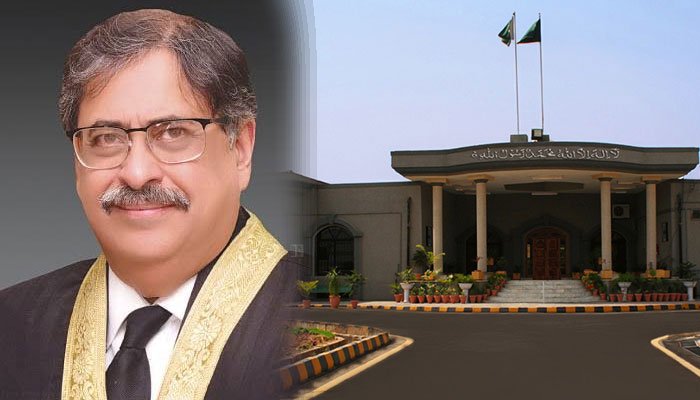CJ IHC Athar Minallah declares PECA amendment ordinance 2022 unconstitutional
ISLAMABAD ( Web News )
The Chief Justice Islamabad High Court (IHC) Justice Athar Minallah on Friday struck down the controversial Prevention of Electronic Crimes (Amendment) Ordinance, 2022, terming it “unconstitutional”.
IHC Chief Justice Athar Minallah issued a four-page order while hearing identical petitions filed against the controversial PECA ordinance and its section 20, which criminalises defamation. The court had earlier reserved its verdict. The detailed judgment will be issued later on.
In the written order Justice Athar Minallah said that freedom of expression was a fundamental right and reinforces all other rights guaranteed under the Constitution.
Free speech and the right to receive information are essential for development, progress and prosperity of a society, he said, adding that their suppression was “unconstitutional and contrary to the democratic values”.
“The criminalisation of defamation, protection of individual reputations through arrest and imprisonment and the resultant chilling effect violates the letter of the Constitution and the invalidity thereof is beyond reasonable doubt,” the order stated.
Justice Minallah said the PECA ordinance was “promulgated in derogation of the Constitution and the fundamental rights guaranteed thereunder, particularly Articles 9, 14, 19 and 19-A”. The jurisdictional preconditions were also not in existence, he observed.
The IHC CJ declared the PECA ordinance and its promulgation as “unconstitutional” and struck it down.
He further declared “the offence under section 20 of the Prevention of Electronic Crimes Act, 2016 to the extent of the expression ‘or harms the reputation'” unconstitutional.
Section 20 of the Act states: “Whoever intentionally and publicly exhibits or displays or transmits any information through any information system, which he knows to be false, and intimidates or harms the reputation or privacy of a natural person, shall be punished with imprisonment for a term which may extend to three years or with fine which may extend to one million rupees or with both.”
Justice Minallah said in his order that the punishment for the offence was also “unconstitutional” and hence, both, the offence and punishment, were “struck down”.
Consequently, he stated, “proceedings against petitioners in connected petitions” were a “nullity and thus quashed”.
However, he added, the aggrieved complainants may “avail remedies provided under respective laws in the context of defamation”.
The judge said the federal government was expected to review defamation laws, particularly the Defamation Ordinance, 2002, and suggest appropriate legislation for effective implementation of the laws.
The Islamabad High Court asked the Federal Government to review the defamation laws, particularly the Defamation Ordinance, 2002 and thereafter propose appropriate legislation to the Majlis-e-Shoora (Parliament) for making its implementation effective.
The court stated that the Secretary, Ministry of Interior, Government of Pakistan shall probe into the conduct of officials of the Cyber Crime Wing of Federal Investigation Agency, which had led to widespread abuse of powers and the consequent grave violations of fundamental rights of the citizens.
The court also ordered the Secretary, Ministry of Interior to conclude the probe within thirty days from the date of receiving a certified copy of the order and inform the Registrar regarding action taken against the delinquent officials.
The petition against the PECA ordinance was heard by IHC Chief Justice Athar Minallah. The petition was filed by the Pakistan Federal Union of Journalists (PFUJ).
President Dr. Arif Alvi promulgated an ordinance in February to amend the PECA law as the government moved to curb “fake news”. According to journalists and experts, the government’s move aimed to silence dissent on social media and control the media.
The media bodies had challenged the “draconian law” in the IHC following countrywide protests.
The journalist associations, including Pakistan Broadcasters Association (PBA), All Pakistan Newspapers Society (APNS), Council of Pakistan Newspaper Editors (CPNE), Association of Electronic Media Editors and News Directors (AEMEND) and some senior journalists of the country, had filed the petition through senior lawyer Munir A Malik.

